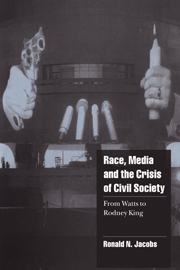Introduction
Published online by Cambridge University Press: 22 September 2009
Summary
Los Angeles is wonderful. Nowhere in the United States is the Negro so well and beautifully housed. Out here in this matchless Southern California there would seem to be no limit to your opportunities.
(W. E. B. DuBois, 1913)Stop your protest or we will use Los Angeles measures against you.
(Tadzhikistan police, 1992)This book is about three disturbing events in the history of Los Angeles, and the ways in which those events were made meaningful in African-American and mainstream news media. The 1965 uprisings in Watts, the 1991 videotaped police beating of Rodney King, and the post-verdict events of 1992 have transformed the image of racial Los Angeles from one of a Utopian Oz, extolled by DuBois in 1913 and named by the Urban League in 1964 as the best city for blacks to live; to a dystopian Blade Runner, with Los Angeles the setting for a tale of moral decay, despair, and the loss of authenticity. Images of racial violence and police brutality hang heavily, casting a dark shadow over glitzy images produced in the dream factories of the City of Angels. Tourists no longer have to wonder what lies on the other side of the Hollywood sign; it is the haunting specter of racial fragmentation.
While most research on Los Angeles has focused on economic change, population shifts, and public space, this book focuses on civil society, culture, and the spaces of representation.
- Type
- Chapter
- Information
- Race, Media, and the Crisis of Civil SocietyFrom Watts to Rodney King, pp. 1 - 18Publisher: Cambridge University PressPrint publication year: 2000



